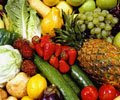| Nearly every food preparation process will reduce the amount of nutrients in food. Processes that expose the food to high heat, light or oxygen will create the greatest nutrient loss in your food. It is always best to keep these processes to a minimum; consuming raw foods is definitely the best way of getting the most out of your food. Below is a general table showing the nutrient loss for common food processing methods. Actual losses will vary with the type of food, cooking time and temperatures. Typical Maximum Nutrient Losses (as compared to raw food) | ||||
| Vitamins | Freeze- | Dry- | Cook+Drain | -Reheat |
| Vitamin A | 5% | 50% | 35% | 10% |
| Retinol Activity Equivalent | 5% | 50% | 35% | 10% |
| Alpha Carotene | 5% | 50% | 35% | 10% |
| Beta Carotene | 5% | 50% | 35% | 10% |
| Beta Cryptoxanthin | 5% | 50% | 35% | 10% |
| Lycopene | 5% | 50% | 35% | 10% |
| Lutein+Zeaxanthin | 5% | 50% | 35% | 10% |
| Vitamin C | 30% | 80% | 75% | 50% |
| Thiamin | 5% | 30% | 70% | 40% |
| Riboflavin | 0% | 10% | 45% | 5% |
| Niacin | 0% | 10% | 55% | 5% |
| Vitamin B6 | 0% | 10% | 65% | 45% |
| Folate | 5% | 50% | 75% | 30% |
| Food Folate | 5% | 50% | 75% | 30% |
| Folic Acid | 5% | 50% | 75% | 30% |
| Vitamin B12 | 0% | 0% | 50% | 45% |
| Calcium | 5% | 0% | 25% | 0% |
| Iron | 0% | 0% | 40% | 0% |
| Magnesium | 0% | 0% | 40% | 0% |
| Phosphorus | 0% | 0% | 35% | 0% |
| Potassium | 10% | 0% | 70% | 0% |
| Sodium | 0% | 0% | 55% | 0% |
| Zinc | 0% | 0% | 25% | 0% |
| Copper | 10% | 0% | 45% | 0% |
Showing posts with label Nutrient Savvy. Show all posts
Showing posts with label Nutrient Savvy. Show all posts
Monday, March 31, 2008
Nutrient Loss During Cooking, Freezing, Drying and Reheating
Thursday, March 27, 2008
The Importance Of Taking A Multivitamin Supplement
 It's absolutely crucial that your body gets the nutrients it needs to function effectively and efficiently. The daily stress of pollution, fatty and processed food, and stress deplete your body of nutrients and it's up to you to replace these nutrients. You can do this through healthy nutrition, or even better, through healthy nutrition and proper supplementation.
It's absolutely crucial that your body gets the nutrients it needs to function effectively and efficiently. The daily stress of pollution, fatty and processed food, and stress deplete your body of nutrients and it's up to you to replace these nutrients. You can do this through healthy nutrition, or even better, through healthy nutrition and proper supplementation.For the average person, it's difficult to get the proper amount of nutrients needed from food alone. Even the healthiest of eaters might not be getting the recommended amount of vitamins and minerals. This is because it's hard to judge exactly how much nutrients you are getting from the food you are eating, not to mention certain forms of cooking actually destroys the vitamins and minerals in the food. This is why taking a multivitamin supplement is so benefiting.
The best thing you can do for your body is to eat a balanced diet and supplement it with a quality multivitamin. You'll get the nutrients your body needs from the food and then back it up with the multivitamin for a power packed effect.
There are four forms of multivitamins you can buy: capsule, tablet, soft gel, and liquid. Avoid tablets at all costs because they are the hardest for your body to breakdown and absorb. Liquid multivitamins are the easiest for your body to absorb because there's nothing for your body to breakdown, but capsules and soft gels are also good forms of multivitamins in reference to absorption rate.
So which multivitamins are good ones to buy? Generally speaking, you pay for what you get. The cheap supermarket multivitamins are inexpensive but can't compare to a quality, more expensive multi. Your best bet is to decide how much you can afford to spend and then do research on the Internet on the multivitamins that fall within your price range.
Multivitamins are probably the single most important supplement you can take. If you aren't taking one, you really should consider doing so.
Source: http://www.healthguidance.org/authors/161/Ryan-Cote
Saturday, March 15, 2008
Leaning Out?

If you are looking to reduce your body fat percentage, be aware that you may be lacking many nutrients. It is always best to obtain nutrients from food but if you are on a restricted diet you may need to obtain those required nutrients from supplements. Below are recommended daily allowances for specific nutrients you may be lacking from a restricted diet.
Nutrient - RDA
Calcium - 1,000 mg
Potassium - 4,700 mg
Fiber - 25 mg
Magnesium - 320 mg
Vitamin A - 2,310 IU
Vitamin C - 75 mg
Vitamin E - 15 mg
Calcium - 1,000 mg
Potassium - 4,700 mg
Fiber - 25 mg
Magnesium - 320 mg
Vitamin A - 2,310 IU
Vitamin C - 75 mg
Vitamin E - 15 mg
Subscribe to:
Posts (Atom)


